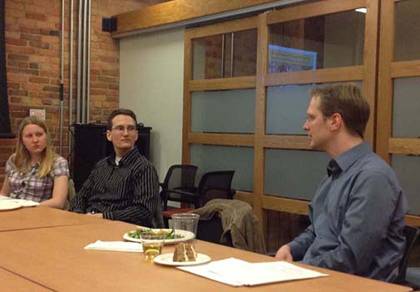
From the Middle East to Burma, Chile and New York’s Zucotti Park, people claim human rights to rally support for goals as diverse as democracy, access to education and campaigns against domestic violence and for self-determination. Yet the phrase escapes a one-fits-all definition and in places such as Syria, the international community and its rights institutions do little to stem atrocities.
There's a role for universities in both defining human rights and understanding how human rights activism can be successful. A new project of the Duke Human Rights Center @ the Franklin Humanities Institute called RightsConnect will what it means to study human rights at the university level.
Funded by a Humanities Writ Large grant and supported by the Mellon Foundation,
RightsConnect will host in 2013-14 a series of lectures and workshops on rights teaching and practice, with distinguished external faculty and practitioners who face real world challenges to rights campaigns.
"Eventually, the cause of human rights requires action from all levels of society: Popes, presidents, prime minsters and international bodies like the United Nations,” says Prof. William Chafe, the Alice Mary Baldwin Professor of History, Emeritus, and the DHRC@FHI Faculty Co-Director.
"But in the end, these 'leaders' respond only when citizens at the grass roots -- democratic insurgents, if you will -- rise up to demand their freedom, their right to a decent life. Studying that process is what we're all about at the Duke Human Rights Center @ FHI."
The DHRC@FHI is also creating new classes that could lead to a future course of study for undergraduates interested in exploring human rights as a focus of their education. Currently, faculty members are leading two DukeImmerse courses, one including a visit to South Africa and another with site visits in North Carolina and Chile, to look at social justice and indigenous issues.
In February, James Dawes, who helped start the Human Rights and Humanitarianism concentration at Macalester College, talked about the role of human rights as a frame for critical thinking and engagement with world events. (See talk here.)
"Human rights are important because they represent both a robust practice shaping world events and a fertile area of study, theory and research that Duke has unique resources to explore," says Robin Kirk, the DHRC@FHI Faculty Co-Director.
Future speakers include. Michael Geyer, who directs the Human Rights Program at the University of Chicago. The DHRC@FHI will also be including a discussion of rights and injustice in the United States as well as new efforts to look at the environment through a rights framework.
The DHRC@FHI is partnering with the Nicholas School to look at issues such as climate change through the lens of human rights.